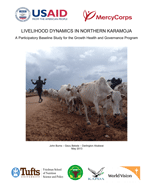This report documents the findings of a livelihoods assessment carried out as part of the USAID funded Growth, Health and Governance program being implemented by Mercy Corps and partners in the Karamoja sub-region of Northeastern Uganda. The assessment is one component of a broader research and learning agenda involving a set of livelihoods, impact and gender studies. The research is being led by the Feinstein International Center with the overall objective of informing the design and implementation of program interventions and assessing impact.
The study was conducted during the first quarter of 2013 in seven markets and thirty-one villages in Abim, Kaabong and Kotido districts. Focus groups were carried out in all villages using semi-structured interviews complemented by participatory exercises including community mapping, timelines and ranking and scoring exercises. The study also included a number of visits to market centers as well as key informant interviews.
The study set out to identify the major opportunities and constraints to production and marketing in the study area and to investigate what productive resources are currently available and how these are being utilized. The assessment also set out to investigate recent events and longer-term trends with the objective of understanding how these might have an impact on production and livelihoods. The study also looked at the current utilization of different products and services from the perspective of program participants. This was done to assess the availability, accessibility and quality of existing services both to inform programming and to establish a service delivery baseline against which to measure impact against. The study also set out to investigate perceptions of poverty and inequality and to quantify the proportion of study participants belonging to different wealth categories. This was primarily done to enable changes in relative wealth to be captured as a proxy for project impact during future assessments.







